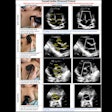Dear AuntMinnie Member,
A fast-scanning technique could make MRI more competitive relative to CT for imaging children who are suspected of having a traumatic brain injury, according to the article that was the most-read story on AuntMinnie.com last week.
Researchers from Colorado showed how well their six-minute MRI protocol worked in a study of younger kids who presented to the emergency department suspected of having a traumatic brain injury. CT is often used in these cases, but the modality's radiation dose has many researchers looking for alternatives. Learn more about the study in our MRI Community.
Ultrahigh-resolution CT
But technological advances are also being made in CT. One of them is ultrahigh-resolution CT, which offers a spatial resolution down to 0.15 mm, compared with 0.23 mm to 0.35 mm for standard scanners.
Also, the International Society for Computed Tomography (ISCT) symposium is underway in San Diego this week, and Associate Editor Abraham Kim is on hand reporting for our CT Community. Check out his story on five reasons why another new technology, photon-counting CT, could be ready for clinical prime time, and find about the 10 pillars of an effective CT lung cancer screening program.
Also visit the CT Community to find out about how the use of volumetry software for assessing suspicious lung nodules affected recall rates in one screening program. As well, learn about an artificial intelligence (AI) algorithm that could make it easier to screen patients for nonalcoholic fatty liver disease.
Get these stories and more -- including more coverage of ISCT 2019 -- in our CT Community.
News from ASTRO
Finally, it was a delight to be in Chicago for once when the temperatures were warm and the leaves were still on the trees, as was the case at this week's American Society for Radiation Oncology (ASTRO) meeting.
Our coverage of ASTRO 2019 included stories on whether hormone therapy after prostate cancer surgery is really needed, a worrisome rise in rates of cervical cancer mortality, and an intriguing effect from stereotactic ablative radiotherapy for metastatic prostate cancer.
Get over to our Radiation Oncology Community for more news from ASTRO 2019.



















